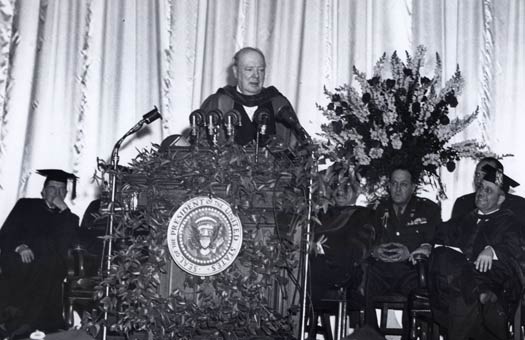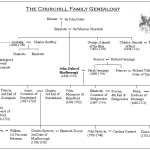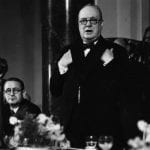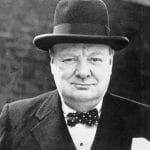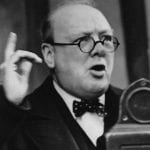This article on the Iron Curtain speech is from James Humes’s book Churchill: The Prophetic Statesman. You can order this book from Amazon or Barnes & Noble.
Churchill’s “Iron Curtain” speech at Fulton, Missouri, on March 5, 1946, ranks as one of the most famous and consequential speeches ever made by someone out of high office, comparable in its force to Lincoln’s “House Divided” speech of 1858 and Martin Luther King’s “I Have a Dream” speech of 1963. It is remembered as the announcement to the world of the beginning of the Cold War, although as Churchill knew the seeds had been germinating for some time. It crystallized the new situation facing the United States and Western democracies and also forecast how the new and unusual “cold” war should be conducted so as to avoid World War III and achieve a peaceful future.
Churchill had difficulty getting the U.S. government to look ahead to the potential political difficulties with the Soviet Union after the war. He remarked to Franklin Roosevelt shortly before the Yalta summit in February 1945, “At the present time I think the end of this war may well prove to be more disappointing than was the last.” Churchill’s great fear as he traveled to the United States in early 1946 was that the Western democracies would repeat the same mistakes that had so nearly cost them their lives a decade before. As he wrote in The Gathering Storm, the Western democracies “need only to repeat the same well-meaning, short-sighted behavior towards the new problems which in singular resemblance confront us today to bring about a third convulsion from which none may live to tell the tale.”
Although President Harry Truman quickly took the measure of the Soviet Union, it was not yet clear whether the United States would embrace a role as the leader of the free world or would link arms with Britain and other Western European nations in a defensive alliance against the Soviet Union. The status and intentions of Soviet forces in Iran and Eastern Europe were uncertain. There was the prospect of Communist takeovers of the governments of France, Italy, and Spain. America was rapidly demobilizing after the victory over Japan barely six months before, and Americans were looking forward to the material blessings of peace. Churchill knew his warning would cast a pall over the mood of the nation.
Truman might have understood the dark intentions of the Soviet Union, but many leading American liberals, such as FDR’s former vice president, Henry Wallace, and his widow, Eleanor Roosevelt, still affectionately referred to the Communist dictator Stalin as “good old Uncle Joe.” It was difficult for Americans, in the space of a few months, to go from regarding the Soviet Union as our ally in war to a potentially lethal enemy. Much of the liberal press was trying to drive a wedge between the U.S. and Britain, while rightwing isolationists opposed any long-term American alliance with European nations.
In the midst of these powerful political crosscurrents, Churchill’s Iron Curtain speech prepared the way for the NATO alliance and a Western plan for defense against Soviet encroachment.
The term “Iron Curtain” defined the Soviet tyranny that extended its grasp over Eastern Europe. Although the public came to know the phrase from Churchill’s Fulton speech, he had first used it in a telegram to Truman the preceding May, days after the German surrender but before the two leaders met for the first time at the Potsdam conference. “I am profoundly concerned about the European situation,” Churchill wrote. “An iron curtain is being drawn down upon their front,” he wrote of the Soviet forces settling down in Eastern European nations. “We do not know what is going on behind . . . . Meanwhile the attention of our peoples will be occupied in inflicting severities on Germany, which is ruined and prostrate, and it would be open to the Russians in a very short time to advance if they chose to the waters of the North Sea and the Atlantic.”
While Churchill is often credited with having originated the phrase “iron curtain,” he may, ironically enough, have gotten the term from Count Schwerin von Krosigk, the foreign minister of Germany in the last days of the war, who, the Times reported, had warned in a radio broadcast a few days before VE Day, “In the East the iron curtain behind which, unseen by the eyes of the world, the work of destruction goes on, is moving steadily forward.”
Regardless of the origin of the phrase in his Iron Curtain speech, Churchill had been looking ahead to this problem since early in the war. In 1970, the retired prime minister Harold Macmillan related to the thirty-year-old Winston Churchill II a conversation he had had with the young man’s grandfather in early 1942. “It was after a dinner hosted by General Eisenhower for the joint Anglo-American command in Algiers, and your grandfather asked me to come back to his room for a drink. ‘What type of man do you think Cromwell is?’ was his odd question to me.
I uttered, ‘Very aggressive, wasn’t he?’ Your grandfather looked at me gravely and said, ‘Cromwell was obsessed with Spain but never saw the danger of France.’”
“At that time,” continued Macmillan to the younger Churchill, “we were losing the war, but with America now in, Churchill had concluded totalitarian Nazism would be defeated and totalitarian Communism would take its place as the threat to Europe and the world.”
Churchill had declined a steady stream of high-profile speaking invitations in the first months after the war, including those from the kings and queens of Norway, Denmark, and Holland, as well as from Canada and Australia. “I refuse,” said Churchill, “to be exhibited like a prize bull whose chief attraction is his past prowess.” But Churchill could hardly turn down an invitation than came from the White House in September 1945. Churchill opened it and saw that it was an invitation to speak at Westminster College in a town he had never heard of. Scoffing, he threw it down and said, “I supposed colleges in America are too named ‘Parliament.’” But his daughter Sarah read it and saw that there was a postscript at the bottom of the invitation. “This is a wonderful school in my home state. Hope you can do it. I’ll introduce you. s/g Harry Truman.”
An introduction by the president of the United States would afford Churchill a world stage—whatever the venue. Though the date of the address, March 5, 1946, was half a year away, the opportunity fueled his imagination. He may have been out of office, but he was still the world’s foremost political figure, a man whose words could still command attention in the world’s leading nation. The thought buoyed his spirit, as he resumed his role of Leader of the Opposition.
In February, Churchill, accompanied by Sarah, sailed on the Queen Elizabeth to New York and then took a train to Miami, where a Montreal friend had lent him his home for some sun and sand before meeting President Truman in Washington.
During the five-day cruise, Churchill had worked on his Westminster College address, using notes he had made in London. His grandson has told me that Churchill would spend an hour for every minute in an address. On this address, Churchill would triple that time.
In Miami, Churchill completed his first draft, writing mostly on the sunny terrace outside the living room. During his stay, he spoke on the need for Anglo-American unity at the University of Miami, where, after receiving his honorary doctorate, he made this comment: “Perhaps no one has ever passed so few examinations and received so many degrees.”
On the last day of February, Churchill took a sleeper to Washington, D.C., where he holed up in the British embassy, editing his address, which he decided to title “The Sinews of Peace,” a play on Cicero’s adage “Nervos belli, pecuniam infinitam” (“The sinews of war are endless money”).
Churchill was striking his familiar theme that only preparedness could ensure peace. The Soviet political and military encroachments could be stopped only by a united West under the resolute leadership of the United States. He wanted to shake America out of the game of intellectual make-believe that engendered its cozy confidence in the United Nations. The mask of democratic pretension had to be ripped from the Kremlin’s face and its imperialism revealed. Churchill saw it as his duty to dispel Washington’s illusion (shared by London) that it was at peace with its former Soviet ally.
By coincidence, a few days before Churchill arrived in Washington, George Kennan dispatched his famous “long telegram” from Moscow. Clarifying the nature and strategy of the Soviet Union and closely tracking Churchill’s views, Kennan’s report became the cornerstone of the “containment” doctrine. The Soviet threat, he wrote, “will really depend on the degree of cohesion, firmness and vigor which [the] Western World can muster. And this is [the] factor which it is within our power to influence.” Kennan’s message attracted considerable attention within the highest reaches of the U.S. government. Churchill, unaware of the secret telegram, could hardly have asked for a better prologue for his Fulton message.
As a political courtesy, Churchill called the White House and inquired if the president wanted to look over a draft of his Fulton speech. The White House replied that Under Secretary of State Dean Acheson would instead call at the British embassy. Lester Pearson, the Canadian ambassador, had already told Churchill that Acheson not only had a sound diplomatic head but also had a keen ear for the elegant phrase.
The tall, elegant, and mustached Acheson must have reminded Churchill of his own foreign minister Anthony Eden. Churchill greeted the under secretary in his green dragon dressing gown. Acheson had two suggestions for the speech. First, eliminate the reference to World War II as “the unnecessary war,” which he thought rightwing Republicans would seize upon to justify their opposition to Roosevelt and their continuing isolationism. Second, include some praise for the United Nations as a peacekeeping instrument. When Acheson left, Churchill acceded to the advice. He also showed the speech to Secretary of State James Byrnes, who, Churchill reported, “was excited about it and did not suggest any alterations.”
On March 4, Churchill joined the presidential party aboard the Ferdinand Magellan (the train specially built in 1939 to accommodate presidential security and Roosevelt’s wheelchair) at Washington’s Union Station. When Truman noticed Churchill studying the presidential seal on the train, he proudly pointed out a change he had made to the seal—the eagle now turned to face the olive branch instead of the arrows. Churchill knew that his speech the next day might dissipate some of the rosy glow of the immediate postwar peace and he could not quite give the new seal his full approval. He asked the president, “Why not put the eagle’s neck on a swivel so that it could turn to the right or left as the occasion presented itself?”
On the train, Churchill finally shared a draft of his Fulton speech with Truman, who expressed his approval. “He told me he thought it was admirable,” Churchill later wrote, after Truman had distanced himself from the speech, “and would do nothing but good, though it would make a stir.” That it certainly did.
During the journey, Churchill continued to make more changes and corrections to his draft, even though an embargoed text had already been forwarded to press offices and chanceries around the world. In his “Scaffolding of Rhetoric”—notes on the art of speaking that he had written almost half a century earlier—Churchill had emphasized the necessity of a metaphor or image to give a picture to an abstraction. In his draft, Churchill had mentioned “tyranny,” “imperialism,” and “totalitarian systems,” but those words lacked imagery that would stick in his audience’s mind.
Late that night in his stateroom, Churchill surveyed a map of Europe, drawing a black line from the Baltic states to Trieste. By one report, it was then that Churchill added the phrase for which his speech would be known. When the train made its only stop for refueling, Churchill lifted his curtain and saw that they were in Springfield, Illinois, “the home of Lincoln.” Sentimentalists like to believe that the ghost of that other champion of freedom and master of the English language inspired him.
The train stopped at the St. Louis station in the early morning of March 5. Churchill took a leisurely breakfast in his stateroom before he and the presidential party switched to a local train for Jefferson City. There, Churchill and Truman entered their open-car limousines for the motorcade into Fulton. Churchill found, to his dismay, that he was lacking the requisite prop—a cigar. So he stopped at a local tobacconist for the purchase.
After lunch at the home of Westminster’s president, Churchill was taken to the college gymnasium for his speech. In his introduction, President Truman was characteristically plainspoken: “Mr. Churchill and I believe in freedom of speech. I understand Mr. Churchill might have something useful and constructive to say.”
Typically, Churchill opened on a light but warm note that immediately won the affection of his audience. With his hands clasping his honorary academic robes, he peered over his black spectacles and harrumphed in his habitual stuttering style:
I am glad to come to Westminster College . . . the name Westminster is somehow familiar to me. I seem to have heard of it before. Indeed, it was at Westminster that I received a very large part of my education.
Then with his palms upturned, as if he was stripped of power, Churchill offered a disclaimer that anticipated the cool reception his speech would receive in official Washington and London: “Let me . . . make it clear that I have no official mission of any kind and that I speak only for myself.”
He continued by stating that the paramount mission facing the world was the prevention of another global war. Raising his forefinger twice in emphasis, he pointed to two institutions with major roles in the maintenance of peace: the United Nations and the continuing “special relationship” between Britain and America. “The United Nations,” he said, “must be a reality and not a sham, and not some cockpit in a Tower of Babel.”
Then, with Miltonic foreboding, Churchill began his celebrated description of postwar Europe: “A shadow has fallen upon the scenes so lately lighted by the Allied victory.” Then with clenched fist, he sketched the cause of that darkness in the paragraph he had added on the train, beginning with this internal rhyme:
From Stettin in the Baltic to Trieste in the Adriatic an iron curtain has descended across the continent. Behind that line lie all the capitals of the ancient states of Central and Eastern Europe: Warsaw, Berlin, Prague, Vienna, Belgrade, Bucharest, and Sofia. All of these famous cities and the populations lie in what I must call the Soviet sphere . . . .
At this point the public address system malfunctioned, but a former army radio technician in uniform sitting under the head table pushed his way through his fellow veterans to find the wire, which he then held to restore the amplification. (Churchill later recorded the speech in its entirety.) The Washington Post reporter, Ed Folliard, who followed only the advance text of the speech, failed to mention the “iron curtain” paragraph in the next day’s paper describing the Iron Curtain speech.
Churchill then offered insight into the mind of the Kremlin that would not be matched until the days of Ronald Reagan: “I do not believe that Soviet Russia desires war. What they desire is the fruits of war and the indefinite expansion of powers and doctrines.” For such Soviet imperialism, he offered this prescription:
From what I have seen of our Russian friends and Allies during the war, I am convinced that there is nothing they admire so much as strength, and there is nothing for which they have less respect than for weakness, especially military weakness.
Then he reinforced his postwar call for action with a reminder of his unheeded warnings before the war:
Last time I saw it all coming and cried aloud to my fellow countrymen and the world, but no one paid attention. Up to the year 1933 or even 1935, Germany might have been saved from the awful fate which had overtaken her, and we might have been spared the miseries Hitler let loose upon mankind. There was never a war in all history easier to prevent by timely action than the one which has just desolated such great areas of the globe. It could have been prevented, in my belief, without the firing of a single shot, and Germany might be powerful, prosperous, and honored today; but no one would listen, and one by one we were all sucked into the awful whirlpool.
Churchill’s reception reflected his audience’s recognition that a great leader had honored their town and college with his visit rather than their appreciation of the stern message. In Washington and around the world, the speech precipitated a storm of denunciation. Both Truman and Attlee took shelter by disowning Churchill’s message; Truman denied that he had any foreknowledge of what Churchill was going to say.
This article is part of our larger selection of posts about Winston Churchill. To learn more, click here for our comprehensive guide to Winston Churchill.
This article is also part of our larger selection of posts about the Cold War. To learn more, click here for our comprehensive guide to the Cold War.
 |
This article on the Iron Curtain speech is from James Humes’ book Churchill: The Prophetic Statesman. Please use this data for any reference citations. To order this book, please visit its online sales page at Amazon or Barnes & Noble.
You can also buy the book by clicking on the buttons to the left.
Cite This Article
"Winston Churchill’s Iron Curtain Speech: Predicting the Cold War" History on the Net© 2000-2024, Salem Media.
July 27, 2024 <https://www.historyonthenet.com/winston-churchills-iron-curtain-speech-predicting-the-cold-war>
More Citation Information.



